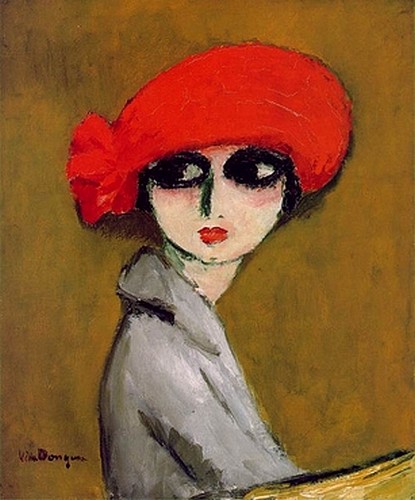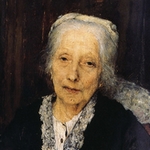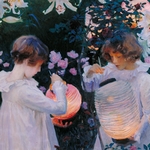Last week I explained to you that Divshare service, were I host the audio files, went down on Wednesday 11th. On Tuesday 24th the service is still down and the company continues without offering any explanation or answering any email. I'm hosting all the audio in a different host and editing every post to update them, starting with the most recent; I'll let you know when everything works properly. I apologize for the inconvenience.

The Corn Poppy - Kees Van Dongen
The Corn Poppy, the painting that illustrates this post, is an oil paint from 1919 by the Dutch painter Kees Van Dongen. It is not very large, 21 1/2 x 18 in, and it is part of the permanent collection of the Museum of Fine Arts in Houston. For some time, a friend of mine often had to travel to that city and fell in love with those big eyes and their innocent expression. I’ve only seen the painting through reproductions but my friend made me fall in love with it too, it became our painting. Sometimes, doesn't it happen that you share with a friend the love for a movie, a song, a picture, and whenever you see or listen to it, it reminds of him or her? Once, I told my friend that I would bring our painting to this blog but then, he died and I found myself completely unable to do it. Now, a year later, I'm able to share the painting and the song I had in mind for it, a song by Benjamin Britten.
Sleep, my darling, sleep, or Cradle Song for Eleanor, the song is known with both names, is written from a poem by Louis MacNiece, an Irish writer who was part of W.H. Auden’s circle. MacNiece went to the United States as a lecturer in 1939, when he was 32; there, he fell in love with the writer Eleanor Clark and took the following academic year on sabbatical to move to America. His stay was short; Maybe his love affair with Eleanor was over or he just felt that his duty was to be at home during the war, the truth is that, at the end of 1940, he went back to England. MacNiece published In 1941 a volume of poetry, Plant and Phantom, dedicated to Eleanor Clark; The last poem, written in October 1940, is Sleep, my darling, sleep, a man watches over a woman who sleeps unaware of his lover's troubles.
Benjamin Britten also went to the States while MacNiece, although he went back home later, in 1942. The composer and the writer met and collaborated in staging a play during the 30s but I don't know if they happened to meet in America; it's known that Britten began writing his song there but he left it half-done. Britten and MacNiece met again when MacNiece married Hedli Anderson, the soprano to whom Britten and Auden wrote their Cabaret Songs; it seems that it was then, in the Autumn of 1942, when the composer finished his song. It has some American airs; I would say that it sounds somehow like blues, although I don't have the faintest idea about blues... Pay attention to the first verse; some people find some resemblance between this phrase and another lullaby written a few years earlier, Summertime from Porgy and Bess by Gershwin. The truth is that I didn't notice it until I read about it...
As you see, we hold some doubts about this song: we aren’t sure when Britten started it or ended it and we don't know either when it’s was premiered. The first documented performance was in 1992, fifty years after its composition! Cradle song for Eleanor is not a popular song; I like it very much and I really hope you like it too; our performers are Ian Bostridge and Graham Johnson. Don't ask me why I related this song to The Corn Poppy, I don't know it. Sometimes I look for a painting to match a song and sometimes, as in this case, songs and paintings meet, completely out of my control.
Sleep, my darling, sleep, or Cradle Song for Eleanor, the song is known with both names, is written from a poem by Louis MacNiece, an Irish writer who was part of W.H. Auden’s circle. MacNiece went to the United States as a lecturer in 1939, when he was 32; there, he fell in love with the writer Eleanor Clark and took the following academic year on sabbatical to move to America. His stay was short; Maybe his love affair with Eleanor was over or he just felt that his duty was to be at home during the war, the truth is that, at the end of 1940, he went back to England. MacNiece published In 1941 a volume of poetry, Plant and Phantom, dedicated to Eleanor Clark; The last poem, written in October 1940, is Sleep, my darling, sleep, a man watches over a woman who sleeps unaware of his lover's troubles.
Benjamin Britten also went to the States while MacNiece, although he went back home later, in 1942. The composer and the writer met and collaborated in staging a play during the 30s but I don't know if they happened to meet in America; it's known that Britten began writing his song there but he left it half-done. Britten and MacNiece met again when MacNiece married Hedli Anderson, the soprano to whom Britten and Auden wrote their Cabaret Songs; it seems that it was then, in the Autumn of 1942, when the composer finished his song. It has some American airs; I would say that it sounds somehow like blues, although I don't have the faintest idea about blues... Pay attention to the first verse; some people find some resemblance between this phrase and another lullaby written a few years earlier, Summertime from Porgy and Bess by Gershwin. The truth is that I didn't notice it until I read about it...
As you see, we hold some doubts about this song: we aren’t sure when Britten started it or ended it and we don't know either when it’s was premiered. The first documented performance was in 1992, fifty years after its composition! Cradle song for Eleanor is not a popular song; I like it very much and I really hope you like it too; our performers are Ian Bostridge and Graham Johnson. Don't ask me why I related this song to The Corn Poppy, I don't know it. Sometimes I look for a painting to match a song and sometimes, as in this case, songs and paintings meet, completely out of my control.
Cradle Song for Eleanor
Sleep, my darling, sleep;
The pity of it all
Is all we compass if
We watch disaster fall.
Put off your twenty-odd
Encumbered years and creep
Into the only heaven,
The robbers’ cave of sleep.
The wild grass will whisper,
Lights of passing cars
Will streak across your dreams
And fumble at the stars;
Life will tap the window
Only too soon again,
Life will have her answer –
Do not ask her when.
When the winsome bubble
Shivers, when the bough
Breaks, will be the moment
But not here or now.
Sleep and, asleep, forget
The watchers on the wall
Awake all night who know
The pity of it all.


 One day,...
One day,...













Comments powered by CComment